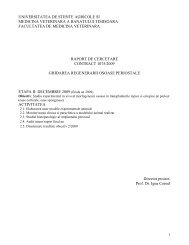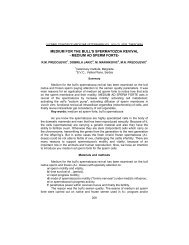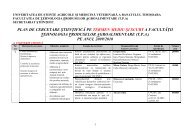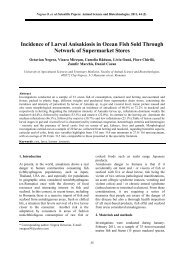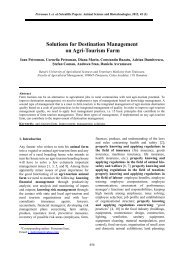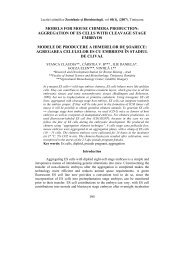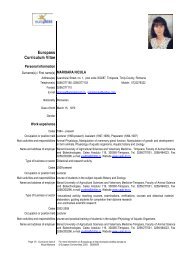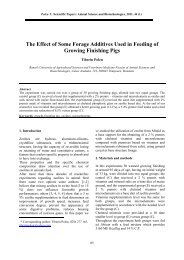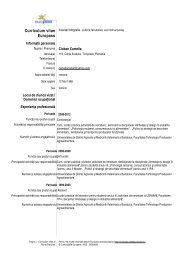journal of linguistic studies
journal of linguistic studies
journal of linguistic studies
Create successful ePaper yourself
Turn your PDF publications into a flip-book with our unique Google optimized e-Paper software.
which actually have nothing in common with the topic and contents <strong>of</strong> their speeches, but<br />
still give them additional weight and importance.<br />
Excellent examples <strong>of</strong> such rhetoric are some <strong>of</strong> the statements <strong>of</strong> the former<br />
American president George W. Bush regarding Saddam Hussein (until September 11<br />
2001 American enemy number 1) and American policy towards the Iraq, in which Bush<br />
applies different strategies.<br />
In his address to the Senate on 26 th September 2002, justifying the security policy <strong>of</strong><br />
his administration, Bush refers to Saddam (whose name has been tabooed already during<br />
the Gulf War in the early 1990’s) using the following sentence as a euphemism:<br />
After all, this is the guy who tried to kill my dad.<br />
http://archives.cnn.com/2002/ALLPOLITICS/09/27/bush.war.talk/<br />
To some people, this expression may seem silly or childish and inappropriate for the<br />
audience for which it has been intended. The fact is, however, that a statement formulated<br />
in this way goes directly and deeply into the feelings <strong>of</strong> every man, thus turning the<br />
conflict with Saddam and his regime into a personal matter <strong>of</strong> every true American and<br />
patriot, and, even more importantly, eliminating every possibility <strong>of</strong> critique because it<br />
would necessarily seem traitorous.<br />
In the same speech, Bush calls Saddam “a man who constantly lies” and in this way<br />
attacks even the moral and every other credibility <strong>of</strong> his and American enemy.<br />
During the discussion in the Congress on the 3 rd day <strong>of</strong> the Gulf war in 1991 6 , Senator<br />
Alfonse M. D’Amato calls Saddam a geopolitical glutton (Mr. President, Saddam<br />
Hussein is like a glutton, a geopolitical glutton.) thus importing biblical connotations into<br />
the debate about current events (voracity or gluttony is one <strong>of</strong> the 7 deadly sins) as<br />
additional justification <strong>of</strong> American actions against the Iraq.<br />
President Bush turned one <strong>of</strong> the darkest dates in the more recent American history,<br />
11 th September 2001, into a euphemism for acts <strong>of</strong> terrorism and every other evil and<br />
threat for the USA and their domestic and foreign policy; at the same time 9/11 is used as<br />
justification for all activities and measures that the USA are taking for their protection. It<br />
is quite clear that the longevity <strong>of</strong> all these and similar euphemisms is guaranteed by the<br />
media which readily accept them and even gradually extend their use on contexts quite<br />
different from those in which these expressions had been originally used.<br />
In Croatian information media, there are also many interesting examples <strong>of</strong><br />
euphemization, which is mainly used to avoid terminology that had become rather<br />
unpopular in our public, but euphemisms are also used as a possibility to avoid giving<br />
completely clear and unambiguous information, especially when these pieces <strong>of</strong><br />
information are related to political or economic issues. Examples <strong>of</strong> such use <strong>of</strong><br />
euphemisms are found both in announcements for the public given by politicians or<br />
economists themselves, and in the form <strong>of</strong> press releases and desk news. Here, one must,<br />
<strong>of</strong> course, keep in mind the specific circumstances resulting from and conditioned by both<br />
recent and more distant past, politics, party and other interests, and a number <strong>of</strong> other<br />
factors that have led to the formation and usage <strong>of</strong> euphemisms characteristic for our<br />
region. In this context, a good example from the category <strong>of</strong> concepts unpopular because<br />
<strong>of</strong> their historical background is the internationally used geographical term the Balkans<br />
(frequently used in the form West Balkans when it includes Croatia) which our politicians<br />
and media avoid and replace with a more usual and more acceptable term the south-east<br />
<strong>of</strong> Europe or simply the region, while our neighbouring states, especially Serbia, are<br />
60



